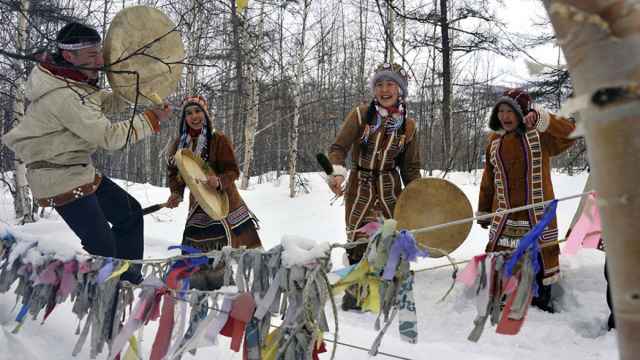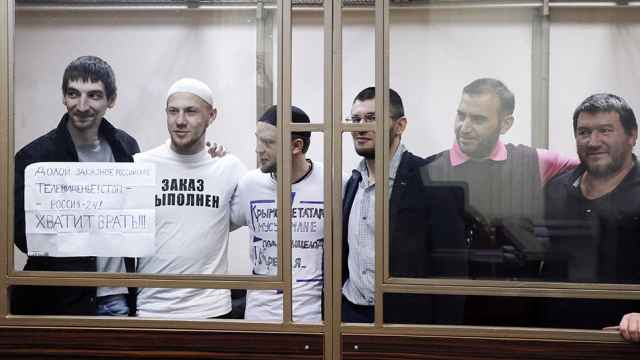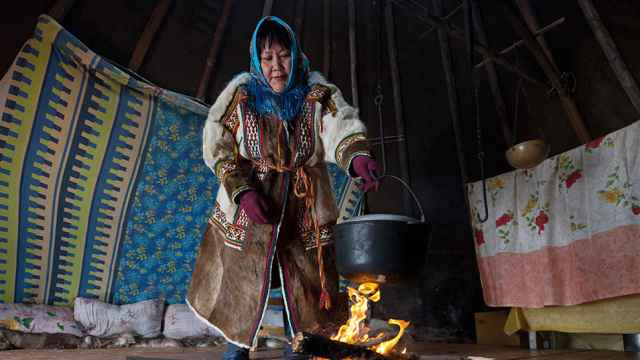The recent shutdown of an indigenous rights group is the latest example of Russia's clamping down on voices critical of the authorities ahead of its chairing of the Arctic Council, indigenous rights activists have said.
The Center for Support of Indigenous Peoples of the North/Russian Indigenous Training Center (CSIPN/RITC) was closed on Nov. 6 after a Moscow court upheld the Justice Ministry’s request to disband the organization over “multiple” violations of the country’s NGO law. CSIPN/RITC denies claims that its paperwork and registration were incomplete.
“The immediate reason for the closure is Russia’s upcoming chairmanship of the Arctic Council,” Dmitry Berezhkov told the Barents Observer.
Berezhkov, who now lives in exile in Norway, is the former vice president of RAIPON, the Russian Association of Indigenous Peoples of the North, Siberia and the Far East.
Moscow will take over chairmanship of the Arctic Council from Iceland in spring 2021 for a two-year period.
“Security forces and strategists are clearing space,” Berezhkov said.
He fears that Moscow is leaving little room for debating issues important to indigenous communities such as coal mining, oil and gas extraction on the Siberian tundra or the expansion-minded timber industry in the taiga.
Berezhkov’s former organization RAIPON received a Justice Ministry warning in November 2012 that it had to close down following irregularities in its organizational statues. A few months later, however, the organization was taken over by new leadership speaking in line with government positions.
Meanwhile, the Center for the Support of Indigenous Peoples of the North (CSIPN) has sailed up as the strongest domestic voice in Russia on indigenous rights.
CSIPN/RITC’s director Rodion Sulyandziga told The Barents Observer that CSIPN’s relationship with international organizations and forums was exactly why the Justice Ministry took it to court.
“This is political. The goal of Russia is to keep us outside any international Arctic venues,” Sulyandziga said.
Sulyandziga himself has seen the security services block his attempts to stay in contact with the international community.
In September 2014, Sulyandziga was detained at Moscow’s Sheremetyevo Airport where an FSB border service agent seized his passport, later returning it with a page cut out. Sulyandziga was on his way to board a plane to New York to attend the UN World Conference on Indigenous Peoples.
Sulyandziga is now calling on the international community to show solidarity with CSIPN/RITC. The claims against the organization are “a continuation of the pressure campaign for its sustained efforts to uphold the human rights of indigenous peoples of Russia’s North,” said Sulyandziga.
Since leaving RAIPON, Berezhkov has launched a a database of analytical publications on the rights of indigenous peoples in northern Russia. He wants international organizations to be aware of the different players — with different agendas — among indigenous peoples.
“When negotiating with RAIPON, international organizations should understand that they are faced with illegitimate representatives of Russia’s indigenous peoples,” Berezhkov said.
RAIPON is permanent participant in the Arctic Council and the group said in a statement earlier in November that it is ready to provide legal assistance to CSIPN/RITC.
RAIPON, though, underlined the need to follow the law.
“We live in a state based on the rule of law and, of course everyone must abide by the law, including the requirements ... of the [Justice Ministry],” the statement said.
Norway, EU concerned
After CSIPN/RITC's shutdown, the European Union called on Russia to “create the proper conditions of state support for NGOs and to foster an open an inclusive environment for their growth.”
Norway’s foreign ministry said free expression, pluralism and defense of minorities are essential for democratic societies.
“It is deeply regrettable that Russian authorities have forcibly dissolved [CSIPN/RITC],” State Secretary Audun Halvorsen told The Barents Observer.
He underlines that for Norway, it will be “important to support and strengthen civil society groups, including in Russia” during Oslo's chairmanship of the Barents Council for the 2019-2021 period.
The Barents cooperation was originally established to foster cross-border contacts between northernmost parts of Norway, Russia, Finland and Sweden.
“We are very concerned about the constant pressure against civil society in Russia, including that of indigenous peoples,” the state secretary said.
‘Foreign agents’
In the Barents region, these troubles are nothing new for nongovernmental groups.
The organization Yasavey Manzara, in the Yamal-Nenets autonomous district, became the first indigenous peoples organization to be labelled ‘foreign agents’ in September 2015.
Since 2014, another seven civil society groups in Murmansk, Arkhangelsk, Karelia and Komi have received the same ‘foreign agent’ stamp, leading to most of them shutting down activities and cross-border contacts.
The ‘foreign agent’ law came into force in 2012, and required organizations receiving funding from abroad whilst engaging in political activity to register as ‘foreign agents.’
Very few organizations voluntarily agreed to designate themselves as such, and from 2014 the Justice Ministry was granted powers to name agents of their own.
A Message from The Moscow Times:
Dear readers,
We are facing unprecedented challenges. Russia's Prosecutor General's Office has designated The Moscow Times as an "undesirable" organization, criminalizing our work and putting our staff at risk of prosecution. This follows our earlier unjust labeling as a "foreign agent."
These actions are direct attempts to silence independent journalism in Russia. The authorities claim our work "discredits the decisions of the Russian leadership." We see things differently: we strive to provide accurate, unbiased reporting on Russia.
We, the journalists of The Moscow Times, refuse to be silenced. But to continue our work, we need your help.
Your support, no matter how small, makes a world of difference. If you can, please support us monthly starting from just $2. It's quick to set up, and every contribution makes a significant impact.
By supporting The Moscow Times, you're defending open, independent journalism in the face of repression. Thank you for standing with us.
Remind me later.






